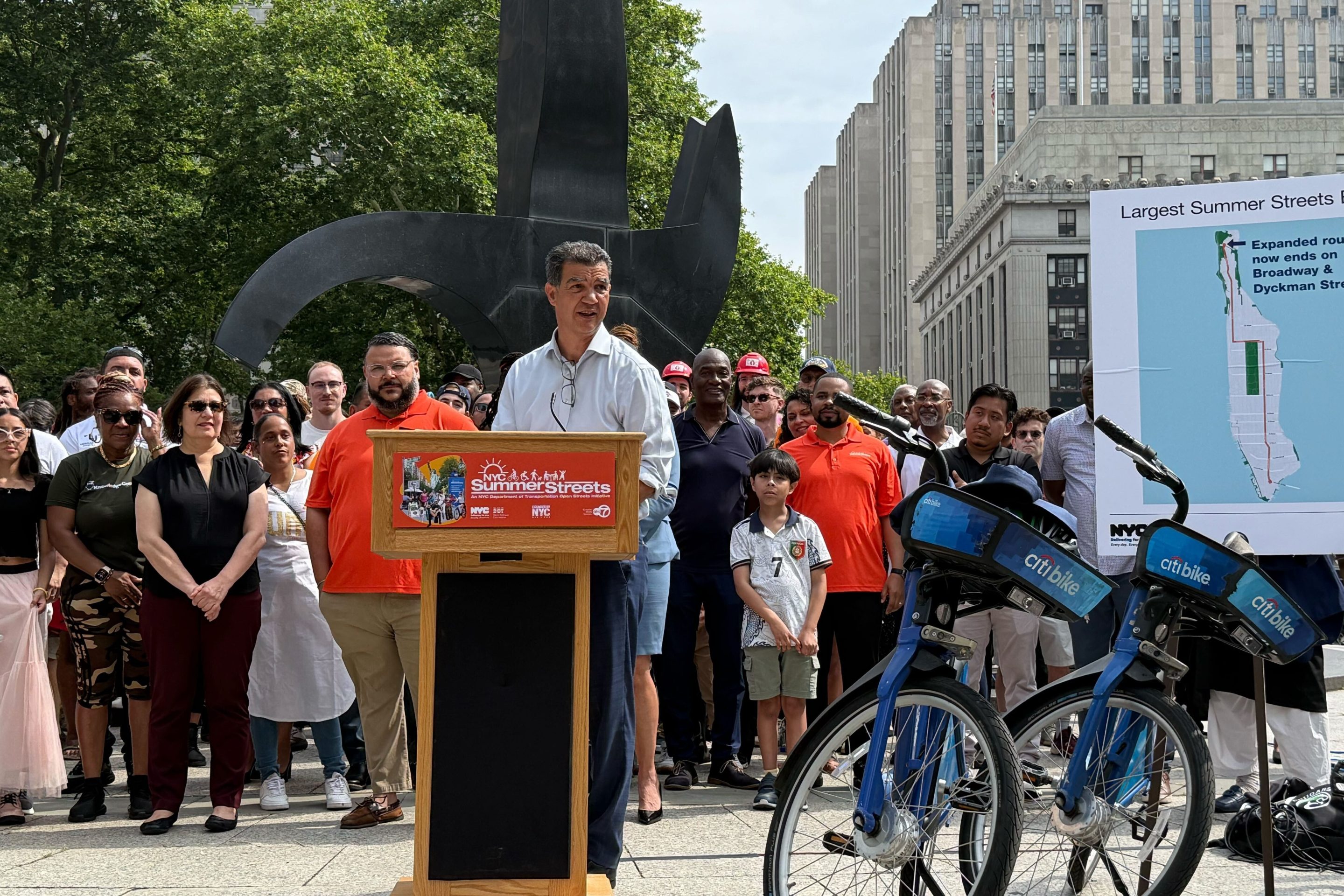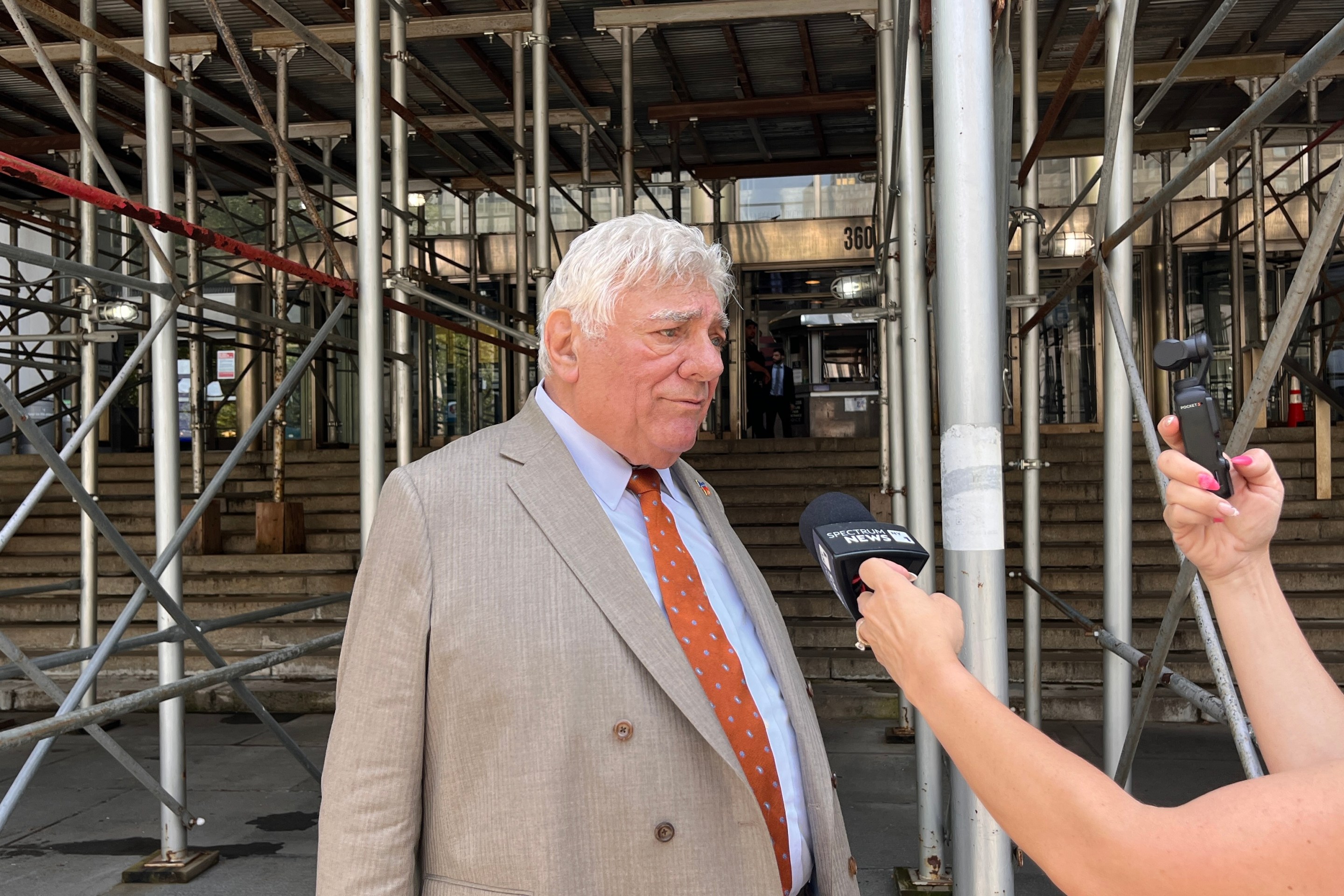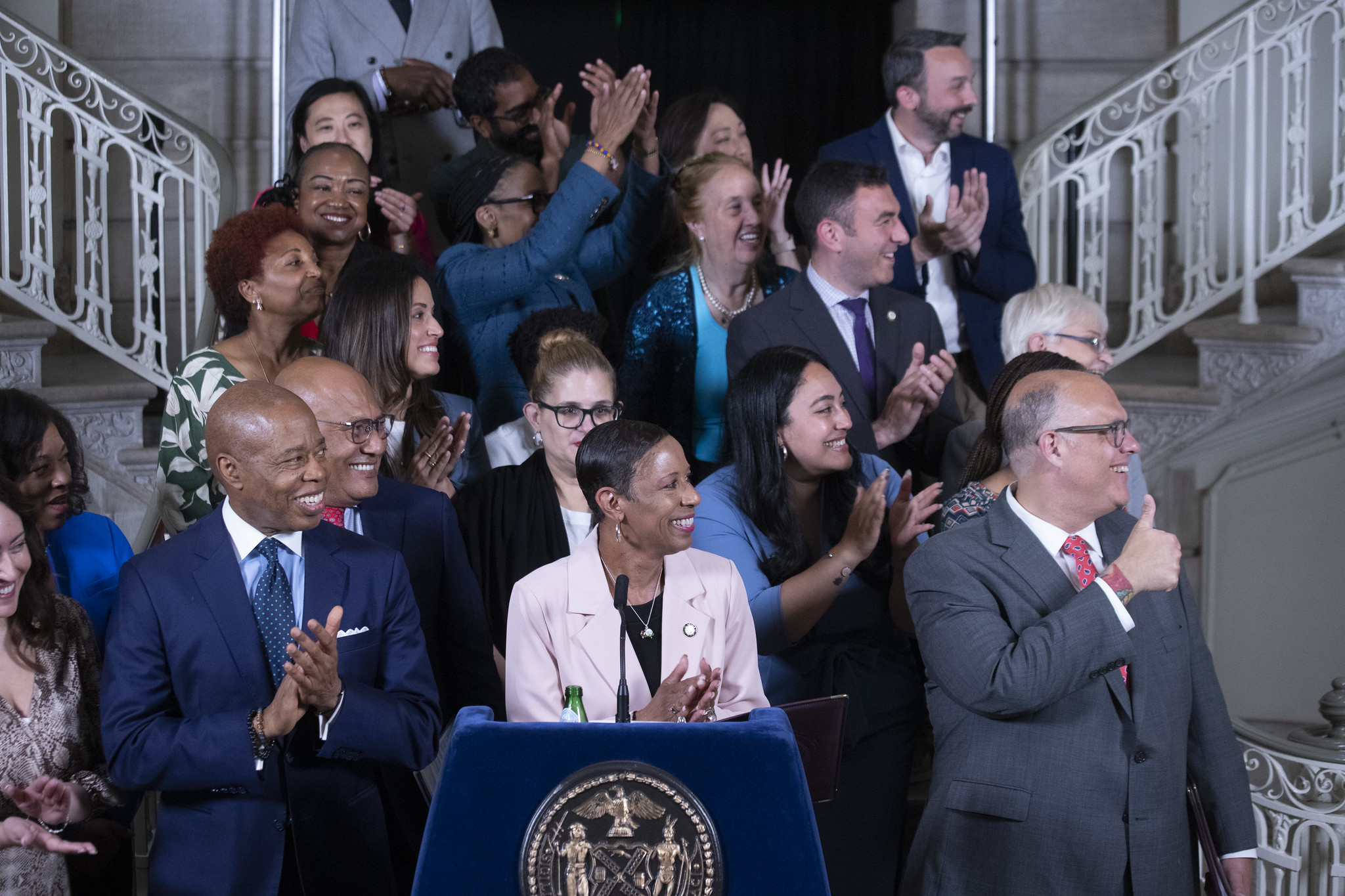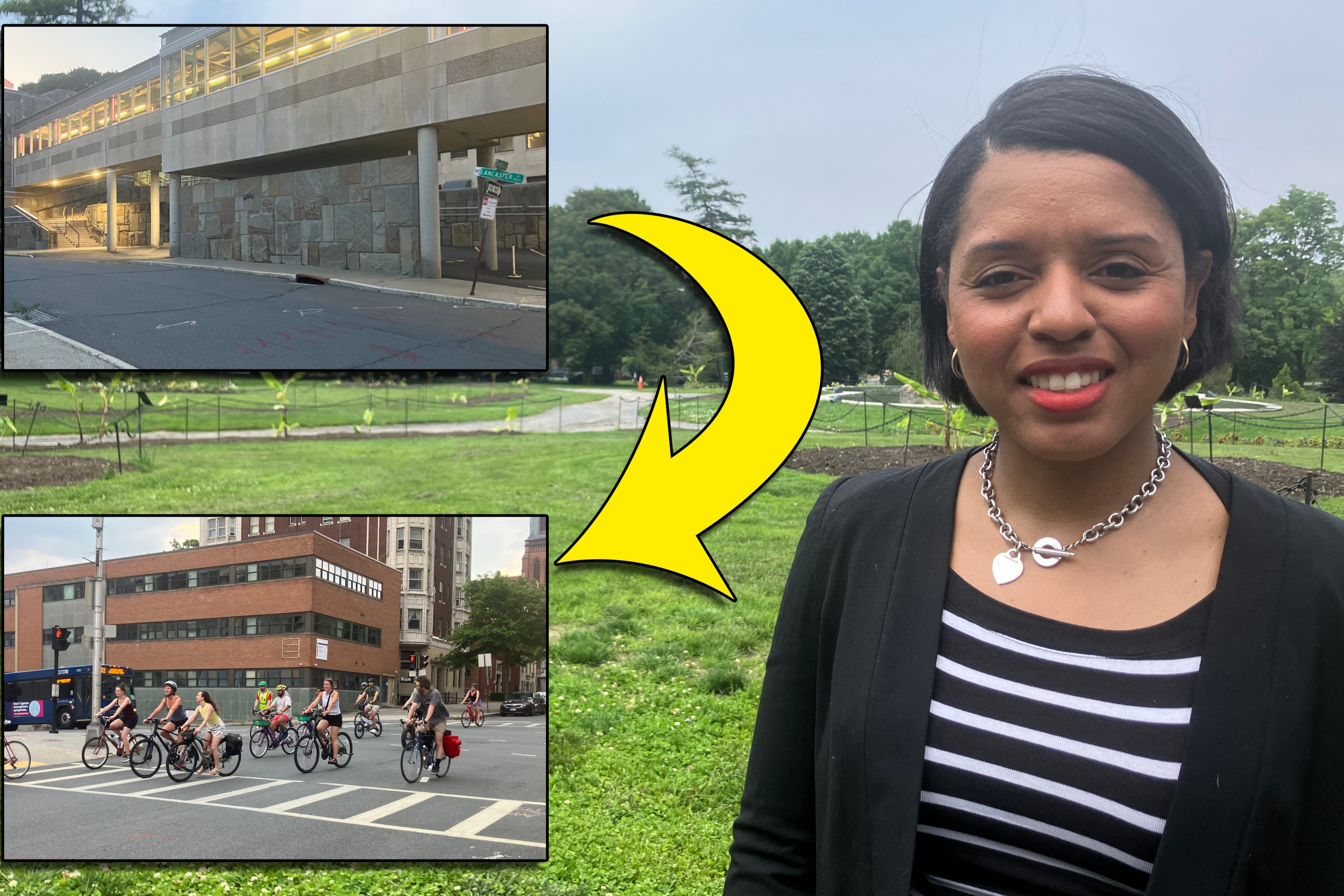He's not with them.
Rep. Ritchie Torres said on Monday that he has concerns about congestion pricing's possible traffic and air-quality effects on the south Bronx, but he wasn't aligning himself with critics such as Staten Island's Rep. Nicole Malliotakis or Jersey jokers Reps. Josh Gottheimer and Mikie Sherril who deny facts about the overall benefits of congestion pricing for transit and pollution reduction.
"I'm not standing at a press conference with them," said Torres, when asked if his criticism of the toll's possible negative impact on his district would empower critics more interested in unfettered driving privileges than they were in environmental justice. "If congestion pricing had no impact on the South Bronx, those people will still be against congestion pricing."
But, Torres added, he also did not want to "stand by idly" as anywhere from 50 to 536 more trucks end up on the Cross Bronx Expressway due to traffic shifts related to the toll, according to the project's recently released environmental assessment for congestion pricing.
Modeling shows that the six scenarios that will raise the mandated $1 billion in revenue for the MTA will increase truck traffic in The Bronx, which is deemed untenable by Torres and Bronx environmental activists.
"We have decades and decades of environmental issues in the Bronx," said Loving the Bronx Director Nilka Martell at the same Monday presser as Torres. But, like Torres, Martell is clearly a supporter: "Once the MTA's program is implemented, it must improve ways to alleviate the fine particulate matter created by these diesel trucks."
Unlike congestion pricing opponents who have kept up a steady drumbeat of opposition to the traffic toll, Torres began his remarks by calling himself a supporter of the idea as a way to raise revenue for the MTA and as a way to reduce congestion in Manhattan's central business district. Torres also refused to characterize congestion pricing as a possible economic killer for the region when asked about possible spillover effects from high tolls for trucks passing through Manhattan, and instead focused on what he said was a possible solution for his district.
"The environmental assessment laid out seven scenarios. And if I remember correctly, the scenario that charges the same price to trucks and vehicles would actually lead to the least amount of congestion or diversion truck diversion. So that might be the best scenario like the balance," said Torres.
The congressman also suggested a number of mitigation measures that he'd like to see the city and state prioritize as the congestion pricing process moves forward.
"What we need are concrete, tangible commitments to capping the Cross Bronx, greening the Hunts Point Terminal Market, installing electric vehicle charging stations and electrifying the trucking fleet. We need money we need investment from the state," he said.
State and MTA leaders say they're hearing Torres, but didn't initially suggest any specific action or promises were on the table. Torres said he was meeting with the MTA later this week.
"Their voices are not in the wilderness," said Gov. Hochul about Bronx residents. "We are paying very much attention to the issues they are raising and now that’s on our plate to address."
MTA Chairman and CEO Janno Lieber also said Torres was heard, and placed the responsibility on the Traffic Mobility Review Board, the body that must set the congestion pricing toll rates and any possible exemptions to the toll.
"The reason those studies were done ... is to identify all of the localized impacts," said Lieber. "Big picture: congestion pricing is reducing congestion and improving air quality. But depending what version of it, in terms of the pricing and so on that you choose, there may be localized impacts. The idea of the study is to mitigate those. I’m confident the people who will make those decisions about how it is actually done, will take that into consideration, and address the Cross Bronx issue."
Torres's ideas weren't unlike those suggested by Tri-State Transportation Campaign Executive Director Renae Reynolds, who told Streetsblog that this would be a good kick in the pants to get the city to electrify its own fleet and for the state to incentivize a faster conversion of privately owned truck fleets to electric fleets. Torres also called for more focus on ongoing efforts to improve air quality in the Boogie Down, particularly a plan to reduce emissions from the Hunts Point Terminal Market by replacing diesel-powered refrigeration trucks at the food distribution hub.
The Adams administration and the de Blasio administration before it both promised to prioritize replacing the trucks, known as truck refrigeration units. In the December 2021 report, "Delivering Green," the city Economic Development Corporation wrote that Department of Transportation had begun a pilot program that replaced 68 of the over 1,600 diesel TRUs with electric or hybrid models, and that the agency wanted to expand the program. In a follow-up report, "Hunts Point Forward," the Adams administration promised long-term efforts to either build a modern refrigerated warehouse at the market or to replace every diesel TRU with an electric one.
The EDC also promised to explore how to build a marine freight terminal at Hunts Point, and the New York State Electric Research and Development Authority and the New York Power Authority promised to reduce noise and emissions at the market.
Plans like a marine terminal or a complete warehouse-based reconstruction of the terminal are seen as future endeavors for the area, but experts said that Bronxites deserve answers on the timelines for short-term and long-term projects.
"It absolutely is within the rights of the Congressman and other folks in that neighborhood to ask for a level of transparency in what goes into the decision making and what goes in to the planning," said Tffany-Ann Taylor, the vice president of transportation for Regional Plan Association.
Taylor, like Reynolds, said that the effort to mitigate the potential problems was a multifaceted one that sometimes crossed paths with congestion pricing policy choices.
"If the Traffic Mobility Review Board incentivizes pricing for trucks so that off-hour deliveries is something that can really be scaled up city wide, that's a great initiative," she said.
But other solutions will need more heads to come together, since they're outside of the MTA's and DOT's hands.
"When you're talking about traffic in particular, in theory, it is the DOT because the right away is their purview. But in some instances, you have other entities. In some instances, you have a Port Authority because they own an adjacent property, or you might have an EDC because they own an adjacent property. ... There isn't an overarching organization that is able to bring everybody to the table. And so perhaps there's a way to think about policies that will better incentivize the need for these parties to come to the table," she said.
Among the changes Taylor suggested were continuing the city's push on microdistribution and green loading zones and its push for a conversion to an all-electric fleet, and possibly even Council-led legislative changes to land use rules that would govern how warehouses can be operated in the city.
"Can we mandate that if you purchase a commercial property on our waterfront, you need to invest in maritime equipment such that a portion of your business will not be handled on the road? Do you write policies that say, if you have a building with X amount of feet in X neighborhood, then that means that Y percent of your fleet needs to be powered with alternative energy, and you also need to put funding into investments in the necessary infrastructure to support that," she asked.






